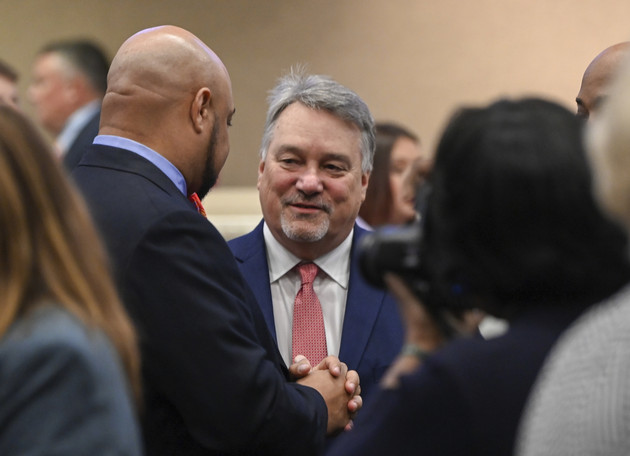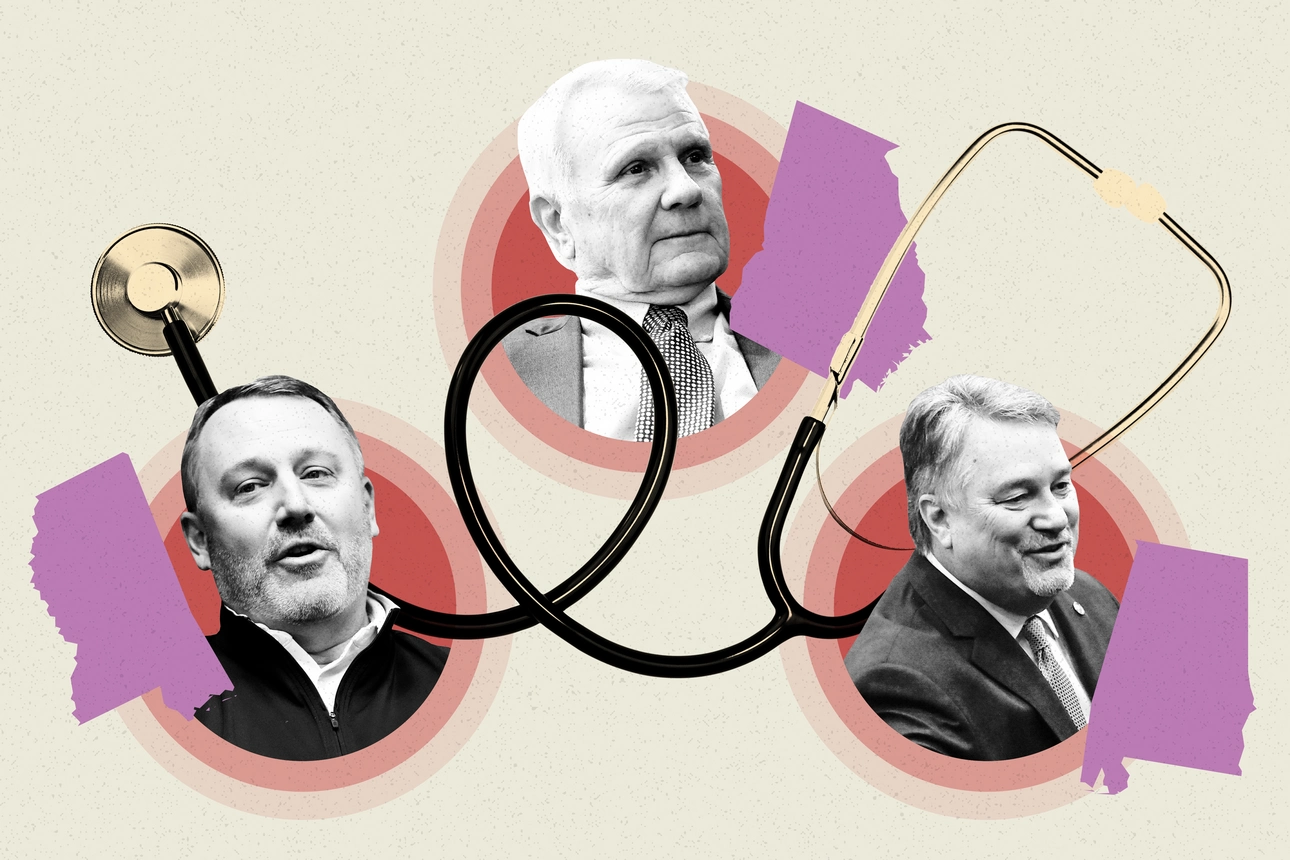The politics have changed’: South warms to expanded health benefits
The South opens a window on public health insurance for more low-income people.
Southern conservatives have for years privately flirted with extending public health benefits to more low-income people. Those talks are now moving out of the shadows.
House speakers in three Republican-controlled states — Alabama, Georgia and Mississippi — have said in recent weeks that they need to consider covering more people through their state-run health insurance programs.
Their comments represent a stark departure from more than a decade of lawmakers in conservative statehouses arguing vehemently against expanding Medicaid or similar benefits — many of them because of a reflexive revulsion to Obamacare.
The changing attitudes could reshape health care in the South by allowing nearly half a million uninsured people to obtain coverage, improving the finances of some of the nation’s most beleaguered hospitals and helping communities with high rates of chronic disease, maternal mortality and avoidable deaths.
“For the first time — really over the last few months in Mississippi — there is this conversation about, ‘Hey, we need to look at these people who don’t have any kind of coverage right now at all. We need to look at some type of an expansion program that fits for Mississippi,’” said Austin Barbour, a Republican strategist and nephew of former Mississippi Gov. Haley Barbour. “Our legislators and other officials are looking for ways to improve our health care system in Mississippi.”
In Mississippi, new House Speaker Jason White said lawmakers have never “fully vetted and looked at the Medicaid expansion population.” In Georgia, Speaker Jon Burns said he is “encouraged” that Republican lawmakers are “looking at the facts that surround expansion.”

And in Alabama, Speaker Nathaniel Ledbetter said the state has “got to have the conversation” about expanding coverage to more Alabamians and that a “private-public partnership” to do so “makes a lot of sense.”
Legislative leaders have met with Alabama Gov. Kay Ivey’s staff multiple times since December to talk about such a proposal, according to an advocate who was briefed on the conversations.
The comments demonstrate how the political liability of the policy has faded and indicate the states are the closest they have ever been to expanding health insurance to low-income people.
“Eight years ago you would have had to dance around the jargon you used because Obamacare still had this bad branding with Republicans, but these days I don’t even think you have to do that,” said Brian Robinson, a Republican strategist in Georgia and deputy chief of staff to former Gov. Nathan Deal, who refused to expand Medicaid. “The politics have changed because the facts have changed.”
Taken together, the three states could provide health insurance to nearly 470,000 more people who don’t have affordable options, according to estimates from KFF, a think tank. And while Texas and Florida — the two largest states that have not opted to expand programs — remain firmly against the idea, opposition elsewhere is clearly softening.
Alabama state Rep. Paul Lee, chair of the House health committee, is one of a growing number of Republicans who have bought into the idea that expanding Medicaid would help people who are working but either are not offered or cannot afford health insurance through their jobs.
“Everyone knows somebody. We know a neighbor, somebody at our church, somebody in our family — or maybe it’s us — who can’t afford health insurance because they’re paying their electricity bills and clothing their children, but yet they’re working,” Lee said. “I have seen very much an open mind [among GOP lawmakers] because it’s affecting everyone.”
Beyond working-class interests, the strategists, lawmakers and health care advocates attributed the GOP’s shift to a constellation of factors: rural hospitals in conservative areas closing their doors; growing acknowledgement among Republicans that expanding coverage would mostly benefit people already working; a belief that the federal government won’t renege on its promise to foot most of the bill; states like North Carolina and South Dakota last year adopting expansion; and increasing frustration from the holdout states that they are losing out on millions in federal dollars.
They said Medicaid expansion is not the third rail it became when it was established as part of Obamacare more than a decade ago. Resistance among the GOP has crumbled, antipathy toward former President Barack Obama has faded and there are now 19 states with GOP governors that have expanded Medicaid.
In Mississippi, White replaced a stalwart opponent who once killed a proposal to extend postpartum benefits because it seemed too much like expansion. And in Georgia, House Speaker David Ralston, who died in 2022, for years kept the door shut on expansion alongside the governor and other GOP leaders.
Republican Georgia Gov. Brian Kemp’s partial Medicaid expansion, called Georgia Pathways to Coverage, has struggled, enrolling only 2,344 people in its first five and a half months. But Robinson, who consults for the Georgia Alliance of Community Hospitals and the Georgia House GOP caucus, believes the program has created a path for a full expansion of Medicaid.
It “showed that politically the issue had lost its sting,” Robinson said. “No one was primaried on that issue. No one even talked about it on the campaign trail.”
That has created space for newer legislative leaders, like Burns in Georgia and Ledbetter in Alabama, now in their second years leading the House, and White in Mississippi, who was elected speaker in January, to push a fresh look at the issue.
White, in a statement after the story published, said that addressing a lack of health care options for the state’s low-income working population will “not only improve healthcare outcomes in our state, but bolster an entire segment of our economy.”
“I am confident in the days ahead, we will hear even more from businesses across our great state that providing affordable access to healthcare is not only compassionate, but a tremendous investment in our workforce,” White said.
Charles Murry, a Ledbetter spokesperson, said that while the speaker “is not an advocate for expanding Medicaid, he does believe the state must evaluate all possible options.” That includes a public-private partnership, like the one that exists in Arkansas, which allows states to use Medicaid dollars to purchase private health plans.
Burns did not respond to requests for comment.
Approving Medicaid expansion is still an uphill battle in these states, though. Mississippi Gov. Tate Reeves spent his 2023 reelection campaign arguing against the idea, while Kemp has called a full Medicaid expansion a “failed one-size-fit-none” policy.
Ivey, who could implement a coverage expansion without legislative approval, has been more open, saying that “Medicaid expansion in Alabama will continue to be a serious consideration.”
Spokespeople for Reeves, Kemp and Ivey did not respond to requests for comment.





